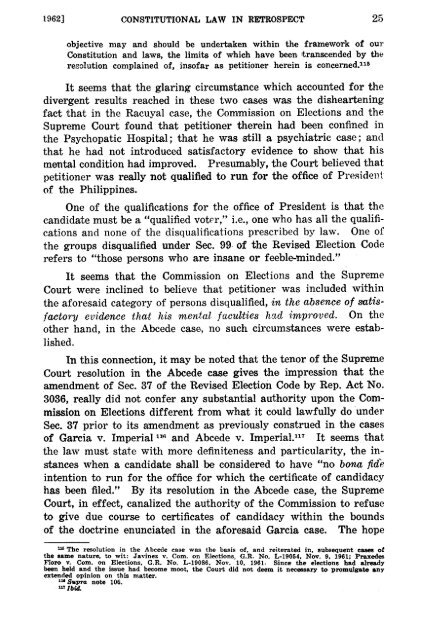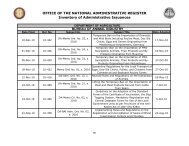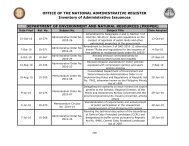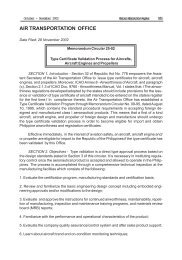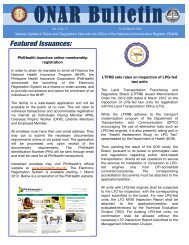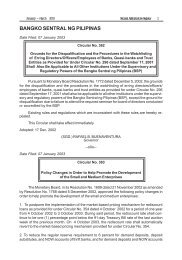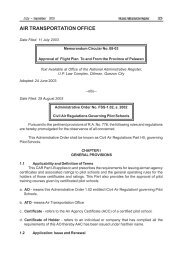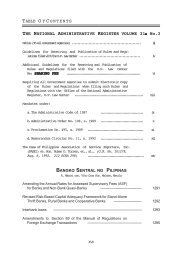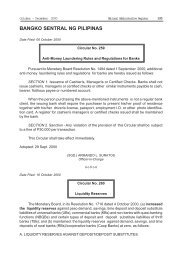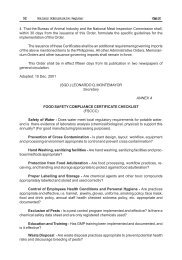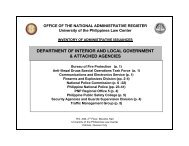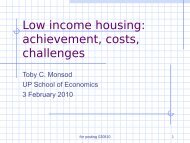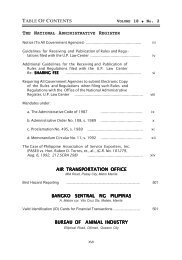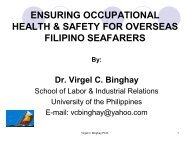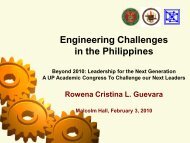PLJ volume 37 number 1 -01- Deogracias Eufemio
PLJ volume 37 number 1 -01- Deogracias Eufemio
PLJ volume 37 number 1 -01- Deogracias Eufemio
You also want an ePaper? Increase the reach of your titles
YUMPU automatically turns print PDFs into web optimized ePapers that Google loves.
objective may and should be undertaken within the framework of our<br />
Constitution and laws, the limits of which have been transcended by the<br />
resolution complained of, insofar as petitioner herein is concerned.115<br />
It seems that the glaring circumstance which accounted for the<br />
divergent results reached in these two cases was the disheartening<br />
fact that in the Racuyal case, the Commission on Elections and the<br />
Supreme Court found that petitioner therein had been confined in<br />
the Psychopatic Hospital; that he was still a psychiatric case; and<br />
that he had not introduced satisfactory evidence to show that his<br />
mental condition had improved. Presumably, the Court believed that<br />
petitioner was really not qualified to run for the office of Pre~ident<br />
of the Philippines.<br />
One of the qualifications for the office of President is that the<br />
candidate must be a "qualified voter," i.e., one who has all the qualifications<br />
and none of the disqualifications prescribed by law. One of<br />
the groups disqualified under Sec. 99· of the Revised Election Code<br />
refers to "those persons who are insane or feebl~minded."<br />
It seems that the Commission on Elections and the Supreme<br />
Court were inclined to believe that petitioner was included within<br />
the aforesaid category of persons disqualified, in the absence of satisfactory<br />
evidence that his mental faculties had improved. On the<br />
other hand, in the Abcede case, no such circumstances were established.<br />
In this connection, it may be noted that the tenor of the Supreme<br />
Court resolution in the Abcede case gives the impression that the<br />
amendment of Sec. <strong>37</strong> of the Revised Election Code by Rep. Act No.<br />
3036, really did not confer any substantial authority upon the Commission<br />
on Elections different from what it could lawfully do under<br />
Sec. <strong>37</strong> prior to its amendment as previously construed in the cases<br />
of Garcia v. Imperial 1 l!6 and Abcede v. Imperial. ll7 It seems that<br />
the law must state with more definiteness and particularity, the instances<br />
when a candidate shall be considered to have "no bona IMe<br />
intention to run for the office for which the certificate of candidacy<br />
has been filed." By its resolution in the Abcede case, the Supreme<br />
Court, in effect, canalized the authority of the Commission to refuse<br />
to give due course' to certificates of candidacy within the bounds<br />
of the doctrine enunciated in the aforesaid Garcia case. The hope<br />
"" The resolution in the Abcede case was the basis of, and reiterated in, subsequent eases of<br />
the same nature, to wit: Javinez v. Com. on Elections, G.R. No. L.19054, Nov. 9. 1961; Praxed •••<br />
Floro v. Com. on Elections. G.R. No. L·19086. Nov. 10. 1961. Since the elections had already<br />
been held and the issue had become moot. the Court did not deem it necessary to promulgate any<br />
extended opinion on this matter.<br />
111 Sv.pro, note 106.<br />
u'lbitl.


